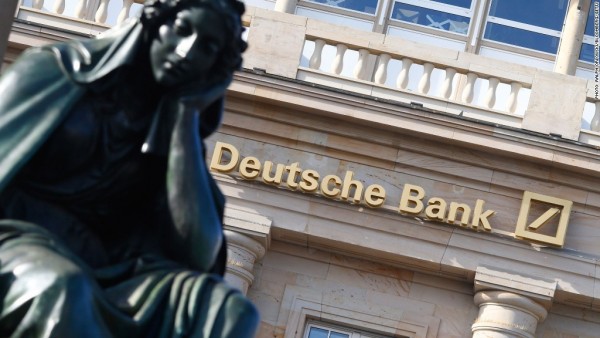The global financial situation continues to deteriorate, driven in large part by the collapse of the petrodollar (not the U.S. dollar – petroleum profits), as one financial expert is now warning that five big European banks are on the verge of “terrifying” failures.
As reported by the UK’s Express, Deutsche Bank, Credit Suisse, Santander, Barclays and RBS are banks whose stocks are beginning to collapse, which is sending shock waves through the global financial sector, says former hedge fund manager and Goldman Sachs analyst Raoul Pal.
As the Express noted further:
At the height of the financial disaster in 2008, the Government was forced to step in and rescue Lloyds Banks and RBS from liquidation, while the European Central Bank gave huge bailouts to Spain, Greece, Portugal and Italy.
Last month, the head of the European Central Bank Mario Draghi raised expectations that it could undergo yet more Quantitative Easing in March – in effect printing billions of pounds worth of money – in the face of ongoing economic fears.
France last month declared a state of economic crisis adding to worries about the stability of the eurozone.
Bank shares fall
These days EU regulations require banks to hold onto more cash, which can be used as a buffer against unexpected market shocks. However, Pal said that balance sheets on the biggest banks are a mess and warned that negative interest rates are starting to take a financial toll.
What’s more, his comments came as several bank shares fell to their lowest levels in years. In January, The Telegraph reported that shares in Lloyd’s looked “increasingly bleak,” after downgrading its rating for a second time in five months. Chancellor George Osborne has even been forced to push back Lloyds Bank’s retail share sale after the bank’s stock value fell too much.
The report also noted that shares of Barclays and the Royal Bank of Scotland (RBS) also fell last month.
The Financial Times reported later last month that Deutsche Bank shares were off 4.5 percent, resulting in a loss of €6.7 billion.
“John Cryan, who has been battling to restore investor confidence in Germany’s biggest bank since becoming co-chief executive in July, said that the result — Deutsche’s first annual loss since 2008 — was ‘sobering,’” FT.com reported.
“I look at the big long-term share charts of them, and I think this looks very terrifying indeed. I have not seen anything like this for a long time,” Pal told CNBC, according to the Express.
“Negative rates are something the banks can banks cannot deal with and that’s being priced into share prices quickly,” he added.
Banking losses could cause bigger problems
Global markets have performed poorly so far in 2016, as fears over dramatically lower oil prices and China’s slowing economy, have investors jittery. Many sold off oil and mining company stock. Now that panic is spreading to other sectors.
For his part, Pal believes that banking losses could become a much bigger concern, than cheap oil and China’s growth.
On Friday, Feb 5, Citibank strategists warned that the global economy had lapsed into a “death spiral” that had the potential to lead to even lower oil prices ($10/barrel range a disaster for oil-dependent economies), bear markets and a new recession.
“The world appears to be trapped in a circular reference death spiral,” Citi strategists led by Jonathan Stubbs said in a report.
“Stronger U.S. dollar, weaker oil/commodity prices, weaker world trade/petrodollar liquidity, weaker EM (and global growth)… and repeat. Ad infinitum, this would lead to Oilmageddon, a ‘significant and synchronized’ global recession and a proper modern-day equity bear market.”
Crude prices have fallen some 70 percent over the past year, while the U.S. dollar has gained 20 percent in value against a collection of currencies.
Sources:


